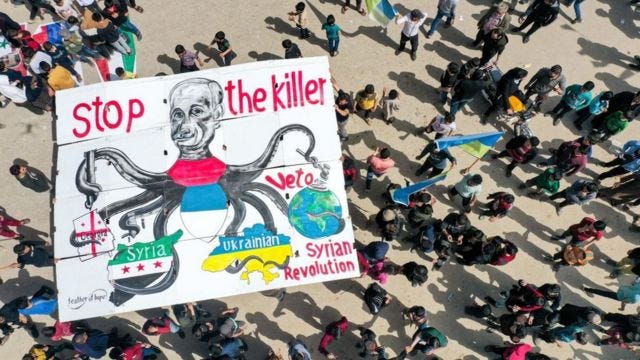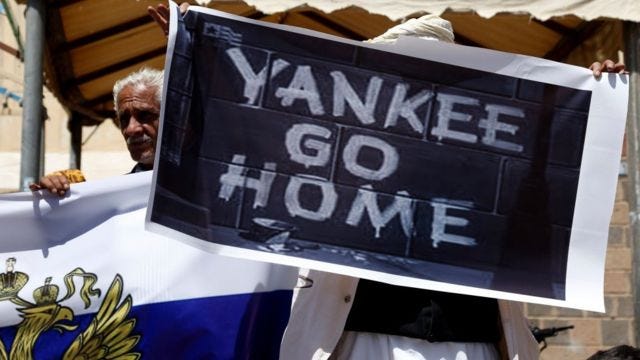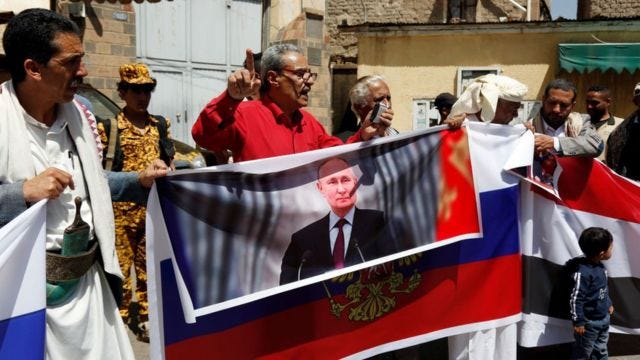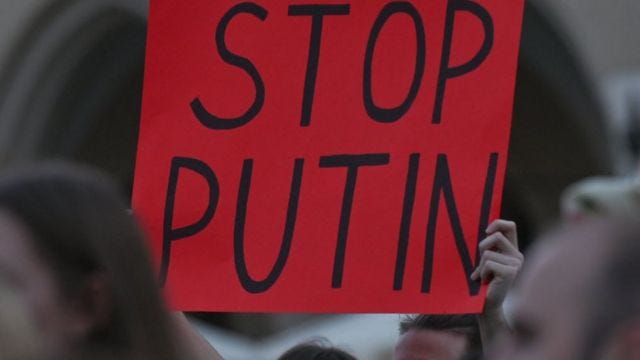Might is right, and the West is wrong. What the Arab world thinks about the war in Ukraine
Reaction to the war in Ukraine across the Arab world has been muted, with little enthusiasm for either sanctions or moves to cut off diplomatic ties. Why?
By Ksenia Gogitidze
A demonstration in the Syrian city of Idlib. Part of the town is still controlled by rebels fighting the Assad regime. © AFP
Reaction to the war in Ukraine across the Arab world has been muted, with little enthusiasm for either sanctions or moves to cut off diplomatic ties. Despite, or perhaps because of the war in Syria, there’s a continued belief in Vladimir Putin’s vision of a multipolar world. The view that Russia is fighting against the West on behalf of all those who dislike the USA has only strengthened.
At a time when the West is clearly losing the information war in many Arab-speaking countries, many states, themselves no strangers to conflict, are choosing to remain neutral in the war the Kremlin is now pursuing in Europe. While there have been some half-hearted condemnations, others are keeping silent. It seems that no-one wants to anger the US or clash with Russia.
“The US has been slowly withdrawing from the region,” says Merissa Khurma, Middle East Program Director at the Wilson Center in Washington.
“Many countries in the region have had to put their eggs in different baskets, and that includes the Russia basket.”
It’s an approach that is becoming the norm for countries in the Arab world.
Syria is Russia’s unconditional ally in all matters.
It was the first, and is, so far, the only country in the region to follow Russia’s lead and recognize the self-proclaimed DNR (the Donetsk People's Republic) and LNR (the Luhansk People's Republic).
In March Syria also voted against a UN resolution condemning Russian aggression in Ukraine. Algeria, Iraq, Iran and, initially, the United Arab Emirates, abstained from the vote. Others like Morocco, preferred not to vote at all.
"While the majority of governments in the region have much stronger relations with the United States, Russia has become an increasingly important commercial and military partner," says Kelly Petillo, Programme Coordinator for Middle East and North Africa at the European Council on Foreign Relations.
After Russia invaded Ukraine, most Middle Eastern states opted for a wait and see approach, says Merissa Khurma. Many of them eventually voted for a UN resolution condemning Russia’s actions in Ukraine, but they have not gone beyond this symbolic gesture.
"From a business perspective, we don't choose sides,” Qatari Energy Minister Saad Al-Kaabi told CNN during an international conference in Doha. “We act as a business and we do our business."
The United States has long made it known that it wants to reduce its influence in the region, beginning its a gradual withdrawal a few years ago. Russia wants to fill the empty space left behind. © Getty Images
In recent years, even America’s traditional allies in the Middle East have tried to diversify their ties by building relationships with other countries, including Russia.
As US influence wanes, it’s clear that these countries want to make the most of the capital they’ve accumulated elsewhere.
The perception that Ukraine is part of a wider conflict is also important, says Kirill Semyonov, an expert at the Russian International Affairs Council (a non-profit organization founded by presidential decree from President Dmitry Medvedev in 2011).
“For many Arab countries, Russia is actually at war with all of NATO, not just with Ukraine,” he told the BBC.
Battle for hearts and minds
After the September 11th attacks, US politicians and military leaders set out to "win the hearts and minds" in Iraq and other Middle Eastern countries.
But two decades on it’s Russia that is now playing a key role in the battle for hearts and minds of the Arab world, says Nadia Oweidat, Associate Professor at the University of Kansas and Fellow at the Middle East Program at the Woodrow Wilson International Center.
Oweidat has been studying the way the war in Ukraine is being covered in the Arabic-speaking world.
As she explains, a key fact is that young people make up the majority in Arab countries, with 60% of the population now under 25 years old. They use social networks, read Facebook and Twitter, but information in Arabic about the Ukrainian conflict comes mainly from channels linked to Russia.
This means that young Arabs are reading an interpretation of events offered by Russia and not Ukraine or the Western world. There is almost no alternative point of view, and the tiny amount that appears from independent channels is inevitably drowned out by the thousands of messages from the Russian Arabic-language media.
In many countries of the Middle East and North Africa, the US is treated with distrust; for Russia it is the reverse (pro-Russian rally in Yemen) © Getty Images
According to the recent survey of youth sentiment in Arab countries, young people are already gravitating more towards Russia than to the United States - 70% call Russia an ally (26% an enemy), while 57% describe the United States as an ally (41% an enemy.
On the Arabic-speaking Internet, anti-Western sentiment is regularly stoked, and lines about colonialism and the West’s double standards are repeated. One of the frequent refrains is the difference in attitudes towards refugees from Ukraine, who have been warmly welcomed in Europe, compared to refugees from Yemen, Syria and Afghanistan, who were “shut out with fences”.
“Democratic norms are not being defended, or even explained,” says Nadia Oweidat. “There's no questioning of this narrative.”
“The Russian media tactic is to overwhelm Arabic news consumers with a huge amount of messaging to get more reach than the opposing camp,” says Ahmed Nour Middle East and North Africa Specialist at BBC Monitoring.
“They were mostly successful given the viewership and reach figures. There are some Western counter-narratives in Arabic but they are not as influential in terms of reach as the Russian ones.”
Another factor that might have helped Russian outlets to have more popularity among Arab audience is that Arabs have been criticising the Western media since the start of the war, he added.
Shifting the discussion away from the war in Ukraine, making statements about the double standards of the West, and comparing the current situation with previous wars in the Middle East are some of the techniques used by the Russian media in the Arabic-speaking space.
“Russia is seen as a David fighting Goliath, and is basically more righteous, or it's opposing the West that is consistently portrayed as evil sinister colonial.”
"I see absolutely no difference here between George Bush's 2003 invasion of Iraq and Putin's invasion of Ukraine,” says Saudi Arabian political scientist Mansour Almarzoqi from Prince Saud Al Faisal Institute for Diplomatic Studies in Riyadh..
“Riyadh is not part of this conflict and does not want to be part of this conflict.”
"The issue of the Ukrainian crisis, which the United States and Europe are trying to impose on the Arab world, is not close to Arab countries in and of itself," Kirill Semyonov, an expert at the Russian Council on Foreign Affairs, agrees.
In his words, the war in Yemen is much more important for the Middle East, and in the eyes of many countries in the region, it is exactly the same as the war in Ukraine. "So, Russia's position for many countries is not incomprehensible and inexplicable, as it is, for example, in Europe."
Brave new world, or what does Syria have to do with it?
A Russian victory would add arguments to those who are looking for a governance model which is different to democracy, a shift in geopolitics, a new look at international law, and a different security model.
The Arab countries have a different vision of the situation and a different attitude towards Putin compared with the United States and Europe © Getty Images
The bloody protests of 2011, which have gone down in history as the ‘Arab Spring’, did not lead to democratic changes, but rather had the opposite effect on the Arab world – since then, almost all countries have turned towards authoritarianism, losing their last crumbs of faith in democracy.
The latest public opinion poll by the Arab Barometer network conducted for the BBC News showed that people in the Arab world are losing faith that democracy can bring stability to the Middle East and North Africa.
“If Russia is successful in Ukraine, there will be a lot of appetite in the Middle East to do a mini copy of Russia, or actually to feel strengthened by Russia,” says Anicee Van Engeland, Associate Professor at Cranfield University.
Russia is taking advantage of the fact that the United States has lost interest in the Middle East and has long been trying to fill the resulting vacuum. Many experts now pinpoint the war in Syria, and in particular Russia entering that conflict, as the turning point that changed the balance of power and attitudes towards Russia and the world.
"Russia has shown what it can do back in Syria, it has demonstrated its hard power, and the Arab world respects power and similarly respects Russia," says Fabrice Balanche, Associate Professor and Research Director at the University of Lyon-2, and an adjunct fellow at The Washington Institute.
The United States did not fulfil its promise to punish the Syrian regime for using chemical weapons, which has freed the hands of Bashar al-Assad and his main ally, Russia.
Since then, Balanche argues, Arab countries believe that the West is not as omnipotent and formidable as Russia, and it cannot use force as Putin does.
Russia first practiced their war tactics in Syria, experts say. Aleppo was subjected to airstrikes by Russian aircraft for many months. Mariupol later repeated the fate of Syria’s second largest city. © AFP
“They are no longer afraid of the United States, they are not afraid of Western sanctions. If need be - they can turn to Russia,” says Balanche.
“The war in Syria marked the end of Western hegemony in the world. For the first time since the collapse of the USSR, Russia prevented the overthrow of a regime. Gaddafi was the last leader who was overthrown. There was a shift in 2011-2016."
"They understand that Russia is becoming a kind of new pole, a new force in the new multipolar world that Putin talks about so often," Balanche believes.
The Arab leaders got the impression from the Syrian war that Russia is loyal, "does not abandon its own", as their propaganda slogan proclaims, while the United States did not support Mubarak in Egypt or Zina al-Abidine Ben Ali in Tunisia, who left following the wave of protests during the Arab Spring.
Oil, gas, grain
The war in Ukraine has already affected several sectors which are important for the economy of the Arab world - from oil and gas and agricultural imports to the arms trade and tourism.
The current situation works in favour of the oil monarchies of the Persian Gulf: the rising energy prices allow them to earn more and increase gas supplies to Europe.
Lebanon, Tunisia and Egypt are dependent on Russian grain; Russian businessmen are moving to the UAE; Egypt, together with Russia, supports one of the belligerent parties in neighbouring Libya.
Algeria is buying weapons from Russia; Morocco is hoping for Russia's vote in the Security Council in the dispute with Western Sahara; and Iran and Russia are allies in Syria.
The Western world is in no doubt that the Crown Prince of Saudi Arabia knew about the impending murder of journalist Jamal Khashoggi. © Getty Images
The Gulf countries have been communicating with Russia as part of OPEC+ and have not yet listened to calls from the USA and Europe to increase oil production.
Relations between the Crown Prince of Saudi Arabia, Mohammed bin Salman (also known as MBS) and the United States have been strained since the murder of journalist Jamal Khashoggi in Turkey.
The United States intelligence agencies pointed the finger at MBS personally, claiming that it was specifically him who approved the murder of Khashoggi, a journalist who was constantly criticizing the authorities and had moved to the United States precisely because of his political views. Biden promised back in 2019 that Saudi Arabia would pay for the brutal murder.
“Because many nations in the Middle East are keen on balancing their relationships with the United States and Russia, they may be caught in the middle as the Ukraine conflict unfolds”, writes Margaret Dene, a research assistant at The Washington Institute.
Public dissatisfaction with the way in which the authorities are dealing with another crisis caused by Russia's invasion of Ukraine could lead to protests and further increase instability in the Middle East and beyond.
Going forward, experts say that the attitude of the Arab world to the war in Ukraine will depend on the success or failure of Russia.
The Arab states are pragmatic and will watch how the US conducts itself, as Washington remains an important ally for many countries in the region, says Merissa Khurma of the Wilson Center.
For the moment, however, Russian expert Kirill Semyonov, believes Moscow’s place in the Middle East remains secure.
"Russia's influence in the region will remain unaltered,” he told the BBC. “Russia will be able to maintain all its positions. So far, nothing indicates that it is weakening."








When Obama decided to "move forward" rather than investigating and punishing the republican war of choice in Iraq, he enabled this. When Obama let Syria ignore his "red line" on chemical weapons without consequence, he enabled this. I wouldn't vote republican at gunpoint, but at least they stand up for their "values," however inhuman.